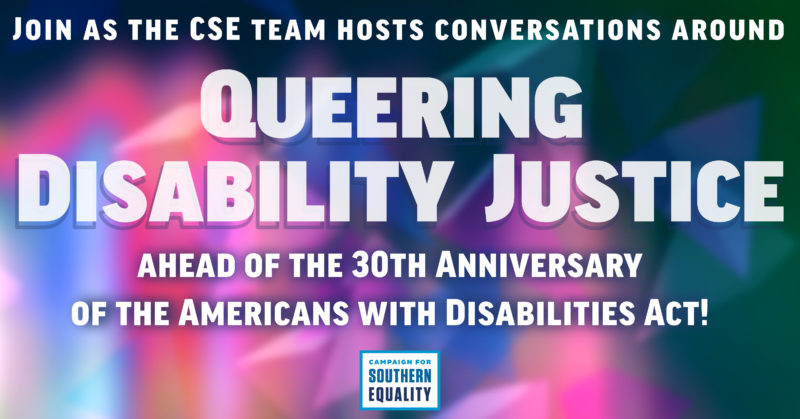Note: Until the end of July, staffers from the Campaign for Southern Equality and other members of the CSE community will be reflecting on the 30th Anniversary of the Americans with Disabilities Act in a series of video conversations. Ivy’s reflection in this blog post below kicks off the conversation series.
Sunday, July 26 marks the 30th anniversary of the Americans with Disabilities Act (ADA), and July is also Disability Pride Month. At the Campaign for Southern Equality, we wanted to be sure to take this landmark anniversary as an opportunity to acknowledge the many LGBTQ Southerners who also live with and are impacted by disability.

As our team started to have these conversations, we were reminded of just how much internalized stigma exists around disabilities, both visible and invisible. Even our own team members needed to reflect on the stigma that we associate with our own various disabilities.
I could write a piece about policy and stay focused on the history of the ADA and how impactful it has been for people who have disabilities – or, as I’m choosing to do here, I could instead be brave and vulnerable and confront stigma head-on by sharing my truth about my disabilities.
The ADA provides us with this definition of disabilities: “A physical or mental impairment that substantially limits one or more major life activities; a person who has a history or record of such an impairment; or a person who is perceived by others as having such an impairment.” Having a disability means moving through a world that wasn’t built for you – an experience that is familiar to so many of us as trans and queer people in the South.
Happy Disability Pride Month to every other queer and trans Southerner who is living with a disability. I hope we can learn to embrace these dimensions of who we are as complete people with the same gentleness, love, and care we’ve learned to embrace our queerness with.” – Ivy Hill
The first disability I knew I had was dyslexia. It made reading and keeping up in school so hard. Because of the ADA, I was allowed extra time to take tests and other support around reading from the school.
Dyslexia was the only disability I knew I had in elementary school – but as I got older, I was diagnosed with depression and anxiety. I was treated for depression – but as it turned out in my case, antidepressants actually made my experience worse, because I actually had a mood disorder coupled with anxiety. My highs were really high. I would get so much work done. But my lows were also really low, and some days, it was just not possible to get out of bed.
When I was finally diagnosed with a mood disorder I was navigating mental health issues as an uninsured trans Southerner in my early 20s. It took a lot of work, and I tried different medications and worked with therapists, but today I want to share a message of hope for anyone else who may be in a similar situation as they navigate their own disabilities: You are not alone.
I’ve had to learn how to do things differently to cope with my disabilities. I use screen readers when I get long emails and text messages. I have to take my medication every day. I have to maintain a regular relationship with a therapist. I have to let myself take naps when I need to. Sometimes I have to take some space because I’m trying to move through my daily life and a panic attack pops up out of nowhere.
Of course we may need to do things a little differently – these systems were not made for us. The systems not being made for us does not mean we are broken. It means the systems are broken.
I live with dyslexia, anxiety, and bipolar disorder. The medication I take to manage my disabilities around mental health should be no more stigmatized than the glasses I wear to manage my disability with my eyesight, and I believe the way we reduce that stigma is to confront our own internalized stigma about having disabilities, and to be honest about our stories when we are able.
This is the first time I’ve ever written about my disabilities, and the first time I’m celebrating Disability Pride Month. Happy Pride to every other queer and trans Southerner who is living with a disability. I hope we can learn to embrace these dimensions of who we are as complete people with the same gentleness, love, and care we’ve learned to embrace our queerness with. <3
WATCH THE VIDEOS:
Dede Norungolo and Al Murray
Dede Norungolo, MRC, CRC, LPC, LAC speaks with Al Murray from CSE about traumatic brain injury, the importance of the ADA, and her work alongside folks living with disabilities. Watch the video.
Rhóna Ramsey and Emily Fox
Rhóna Ramsey and Emily Fox speak about disability justice – including Rhóna’s experiences living with Wolf-Hirschhorn and an Atrioventricular Septal Defect and Emily’s experiences with neuro Lyme disease and diet restrictions. Watch the video.
Priya Ray and Liz Williams
Priya Ray speaks with Liz Williams about the work she does to advocate for people with disabilities, as well as the intersections of her identities as a Southerner, an Indian, and a person who uses a wheelchair. Watch the video.
Adam Polaski and Cecil Robinson
Adam Polaski and Cecil Robinson reflect on their personal experiences with stuttering, a speech disorder. They talk about the intersections of their gay male identity and their stutters. Watch the Video
Holiday Simmons and Mark Travis Rivera
Holiday Simmons interviews Mark Travis Rivera about his work at the intersection of disability and dance, his experience developing cerebral palsy at a young age, and his advocacy alongside and on behalf of people with disabilities. Watch the Video

